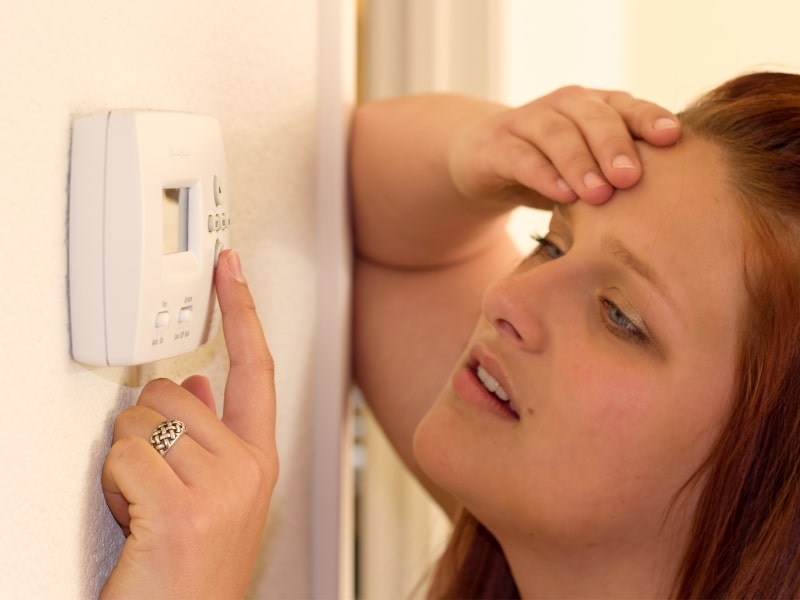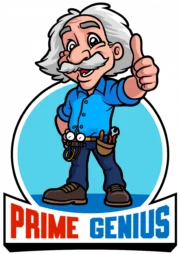
Table of Contents
Heating costs are projected to climb again this winter. According to the U.S. Energy Information Administration (EIA), natural gas prices are expected to rise by around 11% in 2025, averaging about $4.20 per MMBtu, with a potential 8% increase in 2026. While heating oil costs are forecasted to remain slightly lower than last year due to declining crude oil prices, electricity prices may still fluctuate during peak demand periods, especially in colder regions.
At Prime Genius Heating and Air, we know how these rising costs affect Sacramento homeowners. Keeping your furnace well-maintained and efficient is the best way to stay warm while managing energy bills. Below, our experts share the 12 most common furnace problems and practical tips to fix or prevent them before winter hits.
1. Furnace Produces No Heat
If your furnace turns on but doesn’t produce any heat, start with the basics. Check your circuit breaker and ensure the thermostat is set to “heat.” If you have a programmable thermostat, replace the batteries just in case.
Next, make sure your gas supply is turned on. A closed or blocked gas valve is a common cause of furnace problems. For electric furnaces, a failed heating element may be the culprit. Test it with a multimeter for continuity, if there’s none, the element needs replacement.
If everything checks out and your furnace still won’t heat, call an HVAC technician to inspect the ignition system or pilot light.
2. Furnace Doesn’t Produce Enough Heat
When your furnace runs but doesn’t get your home warm enough, or if some rooms feel colder than others, your air filter might be clogged. Dirty filters restrict airflow, forcing your furnace to work harder and heat less effectively.
You should also inspect your air ducts for leaks. Escaping warm air reduces overall efficiency and makes some rooms colder than others. Use mastic sealant or foil-backed HVAC tape to seal small leaks.
If that doesn’t solve the issue, your furnace may have a cracked heat exchanger or air handler problem, which requires professional service.
3. Weak or Inconsistent Airflow
Poor airflow is another common furnace problem. It often stems from dirty filters, leaky ducts, or a blocked blower motor.
Start by changing your air filter, then inspect your ductwork for leaks or obstructions. If you notice weak airflow from your vents, a blower door test can help detect hidden leaks.
If your blower motor doesn’t spin freely, add a few drops of non-detergent oil to the lubrication ports. If the issue continues, contact Prime Genius Heating and Air for a full system inspection.

4. Furnace Won’t Turn Off
A furnace that runs constantly can waste energy and overheat your system. The problem might be a thermostat stuck in heating mode, a dirty flame sensor, or a faulty limit switch.
Try resetting the limit switch if you’re comfortable doing so. Otherwise, let a qualified HVAC technician handle it safely.
5. Carbon Monoxide Detector Alerts
If your carbon monoxide detector goes off, take it seriously. Immediately turn off your furnace, ventilate your home, and call a professional. Carbon monoxide leaks can signal a cracked heat exchanger or gas valve issue, both of which are dangerous and must be fixed by an expert.
6. Water Pooling Around the Furnace
Finding water around your furnace could mean several things. It may be caused by condensation, a clogged drain line, or a humidifier leak if your system has one.
Clear any visible clogs in the drain line first. However, if you suspect a cracked heat exchanger, shut the system down immediately and schedule a repair.
7. Increased Heating Bills
If your heating costs suddenly spike, and it’s not because of colder weather or fuel prices, your furnace might be losing efficiency. Dirty filters or leaking ducts often cause this problem.
HVAC experts agree that unexplained rising utility bills can be a warning sign of a failing system. Schedule a professional inspection to find out whether your furnace needs repair or replacement.
8. Strange Smells Coming from the Furnace
A properly working furnace shouldn’t produce any strong odors. If you smell burning plastic, rotten eggs, or something metallic, shut down your system immediately. These smells can indicate overheating or a natural gas leak.
A light burning smell at the start of the heating season is normal as dust burns off, but persistent odors mean something’s wrong. Call your local Sacramento HVAC professionals right away.
9. Furnace Won’t Ignite
If your gas or oil furnace won’t ignite, check to see if the pilot light is lit. Relight it carefully according to the manufacturer’s instructions.
For oil furnaces, clean the burner nozzles using a mix of kerosene and detergent, then rinse and reinstall them. If the nozzle looks corroded, replace it.
If the problem continues, it could be a faulty ignitor, dirty burners, or a gas valve issue that needs professional attention.
10. Furnace Short Cycling
Short cycling happens when your furnace turns on and off frequently without adequately heating your home. This can result from dirty filters, thermostat issues, or a malfunctioning limit switch.
Start by changing your air filter and checking your thermostat settings. If the issue persists, the limit switch might need repair or replacement.
11. Furnace Making Strange Noises
Rattling, banging, or buzzing sounds coming from your furnace are not normal. If the noise is from your ductwork, seal any leaks, tighten loose connections, and insulate the ducts to reduce vibrations.
If the sound comes from inside the furnace itself, it could be due to loose components, motor issues, or worn-out parts. A professional inspection can pinpoint the exact cause and prevent further damage.
12. When All Else Fails, Reboot the Furnace
If you’ve tried everything and your furnace still isn’t working, power it off for about 10 minutes and then restart it. Surprisingly, this reset solves many common furnace problems, especially in modern systems that rely heavily on electronic controls.
If rebooting doesn’t work, it’s time to call your trusted Sacramento HVAC experts at Prime Genius Heating and Air.
Prevent Furnace Problems Before They Start
The best way to avoid costly furnace problems is through regular maintenance. Schedule a fall furnace tune-up every year with Prime Genius Heating and Air to ensure your system is ready for the cold months.
Our experienced technicians will inspect every component, clean your system, and keep it running efficiently all season long.
Keep your home comfortable, safe, and energy-efficient, contact Prime Genius Heating and Air today to schedule your furnace inspection or repair service.
FAQs
What are the most common furnace problems homeowners face?
Some of the most common furnace problems include no heat, weak airflow, strange noises, short cycling, and a furnace that won’t ignite or keeps running nonstop. These issues usually stem from dirty filters, faulty thermostats, or ignition system failures.
Why is my furnace blowing cold air instead of heat?
If your furnace is blowing cold air, check the thermostat settings, air filter, and pilot light. A tripped breaker, fuel supply issue, or a faulty heating element could also cause this. If those look fine, it’s best to have an HVAC professional inspect the system.
How do I fix a furnace that keeps turning on and off?
This issue, called short cycling is one of the most common furnace problems. It’s often caused by dirty air filters, thermostat malfunctions, or overheating. Start by replacing the filter and checking your thermostat settings. If the issue persists, call a licensed HVAC technician.
Why does my furnace make strange noises?
Rattling, buzzing, or banging sounds usually indicate loose components or airflow issues. Sometimes, these noises can mean a failing motor or blower. If tightening visible screws doesn’t help, schedule a furnace inspection to avoid costly damage.
How can I prevent furnace problems before winter?
The best way to prevent furnace problems is through regular maintenance. Replace filters every 1–3 months, keep vents clear, and schedule a professional HVAC tune-up every fall. Routine maintenance ensures better performance, efficiency, and safety.


